Festival Crossroads: DOK Leipzig
Founded in 1955 DOK Leipzig is the oldest festival for documentaries in the world. Among the "founding fathers" and supporters of the first years were doyens of the genre like Joris Ivens, Alberto Cavalcanti, Santiago Alvarez, John Grierson, Basil Wright, Henri Storck and the young Chris Marker. Thus the festival became a home for the socially committed, artistically demanding documentary – in spite of ubiquitous political instrumentalization. It was always a mirror of GDR foreign policy and its restraints. And yet it often ignored set limitations and created alternative drafts. The festival initiated and showed films on the "national liberation" movements in Africa, Asia and Latin America as well as those on the Vietnam War and the Palestinian crisis, it provided a platform for the filmmakers from those countries and was therefore invaluable for the rising of their cinematographies. Leipzig and its network did also help them with practical support such as providing technical equipment, film material, post production, training or even visas for politically persecuted filmmakers. It was a "window to the world" for East German audiences and the DEFA filmmakers whose films it made known internationally. After the political change in 1989 the festival took a new direction but tried to remain true to itself. It has developed into one of the most dynamic festivals for documentary and animated film – this "twin-track character" also makes it unique in the festival landscape. Traditionally, the Leipzig Festival stands for films advocating peace and human dignity. High-quality art house cinema, superbly narrated stories, a critical eye, subtle observation, tracing back history and scrutinizing the "memory of images" shape the Leipzig Festival’s character and diversity. The programme includes: the International Competitions for documentary and animated Film, the German Competition for Documentary Film , the International Young Talent Documentary Competition, Information and Special Programmes as well as rich historical Retrospectives (e.g. in 2009 dedicated to Joris Ivens). Euros 56,500 in prize-money are awarded. Under the title "DOK Industry" the festival provides networking opportunities for film-makers, producers and international industry professionals, financing opportunities for new film ideas, arranges coproductions and presents recently completed productions to festival programme organisers, distributors and TV buyers. Among the more than 30.000 visitors watching about 350 films from 50 countries in five days are 1.700 professionals from all over the world. The films DOK Leipzig presents at Verzio in Budapest give an insight into the variety of themes and cinematic languages it stands for today like the impressive long term study of an East German family by Thomas Heise, the excellently photographed story of a Russian mother by Pavel Kostomarov/Antoine Cattin, the search for the victim of stoning in Afghanistan (the country Leipzig dedicated a focus this year) by Krzysztof Kopczyn'ski or the brave exposure of oppression of the freedom of speech in China by Liu Wei. Nothing less than "the heART of documentary".
DOK Leipzig team
The program
Children. As Time Flies / Kinder. Wie die Zeit vergeht
Thomas Heise / Germany / 2007 / 86 min / German
A close-up of teenage brothers from Halle-Neustadt, Germany: Paul excels in studies and football while Tommy struggles with school and makes friends with a neo-Nazi. 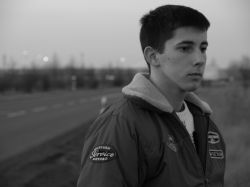
producer: Heino Deckert
editor: Karin Schöning, Trevor Hall
camera: Börres Weiffenbach
sound: Uve Haußig
sales info:
Deckert Distribution GmbH
Marienplatz 1
04103 Leipzig, Germany
tel: + 49 (0)341 215 66 38
fax: + 49 (0)341 215 66 39
email: info@deckert-distribution.com
selected filmography:
Lucky (Niggers), 2006 / My Brother. We’ll Meet Again, 2005 / The Foreigner, 2004 / Fatherland, 2002 / Jammed – The State of Things, 2000 / Inventor, 1982
A Day to Remember / Wangque de Yitian
Liu Wei / China / 2005 / 13 min / Mandarin
4th June 2005. Could this be an anniversary date? In Beijing, passers-by are reluctant to remember what happened 16 years ago. 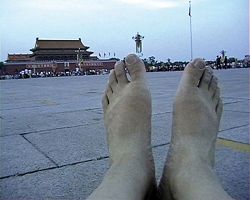
producer: Liu Wei
editor: Liu Wei
camera: Liu Wei
sales info:
L’est Films Group
40, Rue Remy Dumoncel
75014 Paris
France
tel: + 33 669 347437
l.estfilms@gmail.com
Don’t Get Me Wrong / Nu te supara, dar...
Adina Pintilie / Romania / 2007 / 50 min / Romanian
Patients of a Romanian psychiatric hospital debate the weather, God, and other forces they are in daily contact with. 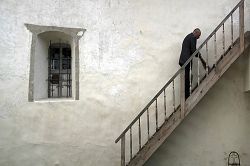
producer: Dan Nutu
editor: Ligia Smarandach, Tudor Petre
camera: Sorin Gociu
sound: Ligia Smarandach, Tudor Petre
production info:
Aristoteles Workshop Association
dan@aworkshop.com
www.dont-get-me-wrong.com
selected filmography:
Sand Pit #186, 2007 / The Fear of Mr. G, 2006 / Nea Pintea...the Model, 2005 / Some Kind of Loneliness, 2005
![]()
Drifter
Sebastian Heidinger / Germany / 2007 / 80 min / German
Three young homeless drug addicts at Berlin’s Bahnhof Zoo station. Is there a way out?
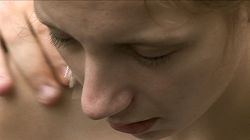
producer: Nils Boekamp
editor: Alexander Fuchs
camera: Henner Besuch
sound: Johannes Schmelzer-Ziringer
production info:
Boekamp und Freunde Filmproduction
Goethestrasse 45
D- 32584 Löhne
tel: 0049.5731.788 525
fax: 0049.5731.788 510
www.boekampfilm.de
info@boekampfilm.de
Mother / La mère
Antoine Cattin & Pavel Kostomarov / Switzerland & France & Russia / 2007 / 80 min / Russian
With her nine children she ran away from her violent husband. Her eldest son is in jail, her daughter just gave birth. Portrait of a mother. 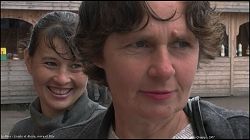
producer: Elena Hill
editor: Antoine Cattin, Pavel Kostomarov
camera: Antoine Cattin, Pavel Kostomarov
sound: Antoine Cattin, Adrien Kessler, Pavel Kostomarov
music: Thierry van Osselt, Alexander J.S. Cracker
production info:
Les Films Hors-Champ
L'Epignau 1
CH-1373 Chavornay
tel: ++ 4121 550 36 40
films@hors-champ.ch
selected filmography:
Antoine Cattin & Pavel Kostomarov: Vivre en paix, 2004 / Transformator, 2003
Stone Silence / Kamienna cisza
Krzysztof Kopczynski / Poland & USA / 2007 / 52 min / Dari
In the spring of 2005, a 29 year-old woman was publicly stoned for adultery in the Afghan village of Spingul. Were there any witnesses?
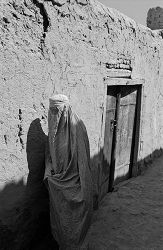
producer: Krzysztof Kopczynski
editor: Anna Dymek
camera: Jacek Petrycki , Hanna Polak
sound: Jarosław Roszyk, Jafar Panahi
music: Krzysztof Knittel
production info:
Eureka Media
Smulikowskiego 13/10
00-384 Warsaw, Poland
tel: +48 22 828 48 10
fax: +48 22 829 56 73
info@ntcm.com.pl